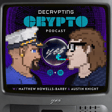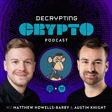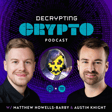Become a Creator today!Start creating today - Share your story with the world!
Start for free
00:00:00
00:00:01

Interview: Gleb Nikitin, Co-Founder of MetaHash - Crypto Mining, dApps & Blockchain Adoption
We speak with Gleb Nikitin, co-founder of MetaHash about how his project takes a new approach to gaining consensus within the mining process, what the future of decentralized applications has in store for us, ad how far we are away from mass adoption of cryptocurrencies. Full show notes: https://thecoinoffering.com/podcast/s02/e06-gleb-nikitin/
Transcript
Introduction to the Podcast and Guest
00:00:05
Speaker
The highways of social and commercial developments are widening without end or limit. Hey, everyone, and welcome to the Decrypting Crypto podcast, a Castbox original show. I'm Matthew Housebarbie, and I'm joined by my co-host, Austin Knight.
00:00:28
Speaker
Hey, Matt, and hello to everyone listening. Yeah, we got a really, really interesting guest on the show today, haven't we, Austin? Yeah, so we're going to be talking with Gleb Nikitin, the co-founder of MetaHash. Yeah, and Gleb's project MetaHash is cool both me and Austin's eye over the past couple of weeks, because there are a few interesting and pretty big claims behind the project.
00:00:57
Speaker
We know that Gleb is a very technical guy.
Gleb Nikitin's Background and MetaHash
00:01:00
Speaker
He can dig into the weeds of all of the tech behind not only the project he's running, MetaHash, but across the wider crypto space. So we wanted to get his thoughts around some different things within crypto mining in particular.
00:01:17
Speaker
one thing that he's calling forging within the proof of stake consensus algorithm that they actually use at MetaHash. And another big thing that we're going to dig into is hearing his thoughts around the current and future state of decentralized applications or as the commonly known dApps. And this is where we want to
00:01:39
Speaker
figure out when are we going to actually be at a place with dApps where they're commonly used by the general public. And when we may see big companies like Facebook and Snapchat and co taking a foray into this space. Yeah. Glub has some really interesting thoughts on this. Some big claims backed up with details. So it's an interesting conversation that we got to have here. Yeah. All right. Well, Austin, should we get this thing going?
00:02:09
Speaker
All right, let's do it. Gleb, welcome to the Decrypting Crypto podcast. Thank you. So let's start off by having you tell us a little bit about yourself and how you got involved in the crypto space. Well, I will start from the very beginning. I have been working in the internet for my whole life. And I would say every cent I have ever earned in my life was in the internet. I started as a graphic designer and a programmer.
00:02:38
Speaker
in 16, doing some website jobs, et cetera, that grew up in a small company, taking more jobs and taking more people in. Then it was like a series of different projects.
00:02:52
Speaker
And I was like finally very interested in advertising systems and like how all that stuff, all that stuff goes. My last company is called Ed Sniper. It was focused on internet real-time bidding. Cause those who is not very specific about the term, I will take you brief. It looks that way. Like whenever a person comes on any website, there is a code from some advertising system and they send us the request.
00:03:22
Speaker
or if we want to buy this particular impression and how much we are willing to pay. That practically means that we receive the request from the internet.
00:03:33
Speaker
Like every second Wow and in some regions like this close to billion requests billion requests per seconds and So like that's a lot. So like we receive requests from like all from all websites. We receive that from Google network from from Yahoo like from everybody from up Nexus and
00:03:55
Speaker
And what we do with that, we are working with big agencies, with big network agencies, that they use our tech to buy advertising for their clients. And Gleb, sorry to interject. Just to clarify, AdSniper, that isn't a blockchain-based business, right? This is the company that you formed, and there's no blockchain technology in that company, am I right?
00:04:23
Speaker
Yes, exactly. At Sniper, it's purely an advertising tech company, but it gives the background for the start of meta-hash. Oh, yeah. That's why I'm explaining, because working with at Sniper, we did a lot of things that are very similar to what blockchain is all about. It's data synchronization, it's keeping
00:04:46
Speaker
millions of requests per second. It's about high load, big data processing, machine learning, et cetera, everything that is really needed in blockchain. And since we were like a pure tech company, we received a lot of requests from clients if we could use blockchain in their projects, like to make advertising more transparent. But at first, our answer was always, well, no, they're like too slow and
00:05:13
Speaker
it won't just fit in, but then we got more and more interested and we were also passionate about the idea of applications that can run all by themselves and be like self-financed. So we have a couple of ideas that we really wanted to implement, but we saw that like the technology stack
00:05:33
Speaker
wasn't there, like there wasn't every piece of technology that we wanted to create great apps. So we saw it would be best for us to take the knowledge from advertising space and from the tech stack that we will build throughout these years and use it to build the needed technology for the concurrent decentralized ecosystem.
00:05:55
Speaker
So that's how it started. Cool. And that's where you then went on to form MetaHash, right?
Understanding MetaHash's Technology
00:06:02
Speaker
Which is now your new company. Yeah, exactly. So tell us about MetaHash and what you all do there. Well, the thing is, everybody usually see us as just a new fast blockchain, but the idea behind the project is a little bit different.
00:06:20
Speaker
The basic idea is that we wanted to build a decentralized cloud hosting for applications that could function in real time. That means that when somebody uploads an application to our network, it just pop-ups on a lot of instances. And where comes the blockchain itself is that these applications must somehow synchronize the data between each other.
00:06:46
Speaker
So because like let's say you have an application that is running in real time and you as a client connect to one of these applications and you save some data there and then you connect to another instance that know nothing about your previous session and hear exactly when the chain comes in.
00:07:06
Speaker
So we needed a cloud of decentralized applications. We needed a plus chain that could transfer data and synchronize data between these instances very fast. And that is the chain part.
00:07:19
Speaker
And of course, like if we found a way to synchronize that data very fast, like we wanted microtransactions to be also available to these applications to perform any type of financial, financial transaction between the user and the application and between the application and the costume. Right. And how far just touching on sort of the speed pieces that typically how fast would it.
00:07:44
Speaker
would an average transaction be on MetaHash? We have currently tested our network on 244 servers around the world. We were just rating different servers and different virtual servers from different providers around the world.
00:08:05
Speaker
And then we ran the tests of about 5 billion transactions that were about three months along. And we got two results that were going from 60,000 to 80,000 per second capacity. And like the majority of time, the transaction confirmation, the irreversible transaction has appeared in less than three seconds.
00:08:29
Speaker
Oh, wow. Wow. That sounds pretty significantly faster than a lot of the larger networks, right? So why is that? If we look at cryptos like Bitcoin, Ethereum, right there, huge networks with processing a huge volume of transactions, but
00:08:47
Speaker
Outside of the Lightning network, transaction speeds are relatively slow. I know you've got platforms like EOS with faster transaction speeds, but there's some debates around how decentralized the likes of EOS are. So why is it that meta-hash is so fast? It's because we've used the problem on a completely different angle. So we were building the network to synchronize fast.
00:09:16
Speaker
And MetaHash has a pretty complex architecture, but it is really there not to complex things up, but to speed up the transactions, speed up the data synchronization, and to put through the network as much data as possible.
00:09:32
Speaker
Talking back to Bitcoin and other popular networks, they did a really terrific job on the cryptographical side, on the medical side of things, and great concepts in blockchain structure and design were born. And many companies like Cardano are making great improvements in the cryptographical space and making adoption to the chain designs themselves.
00:10:01
Speaker
But our company, we had a little bit different skill set that we used. We are all about high-load, about network synchronization, big data processing, and we just added our skills to the existing blockchain patterns and mixed them together. We didn't do any significant cryptographic advance because there is a lot of
00:10:30
Speaker
really teaming around the world working on this. So we really focused on what we do best and that's network centralization and data storage. We did implement one thing that like differs us a lot from chain design. We implemented a new consensus design that we have called Multipos. It's like
00:10:52
Speaker
multiple or multiple proof of stake. It has one feature that stands out from normal chain consensus. Because we did the network design where we can synchronize the network very fast and we did that in a tree manner. So like when the block is born, it goes like a tree and spreads throughout the network. We thought if we did that, why don't we try
00:11:20
Speaker
to verify if the block is correct or not on each step of the synchronization. That means that while we are synchronizing, we are also validating the block. By doing this, it means that we have a much higher rate, not just to get the first acceptance of the transaction within these three seconds, but we can get very high, highly probable irreversible transactions within this trial timeframe.
00:11:49
Speaker
So would it be fair to say the main takeaway there is that you've really improved the efficiency of achieving consensus and generating new blocks, as well as just generally building in the infrastructure that increases the transaction speed? Would that be a good takeaway from that?
00:12:06
Speaker
Yeah, exactly. Okay. And just one thing that I am interested just on, because I know actually we wanted to talk a little bit around consensus and some of the things around mining, which I know Austin had some questions
Scaling and Network Performance
00:12:19
Speaker
for you around. But before we jump into that, around the transaction speed, one thing that is kind of a bit of a
00:12:27
Speaker
A pain point for me that I find is I hear about a lot of projects that will claim very, very fast transaction speeds, but they'll often achieve this when the usage of the network is quite low. And then as soon as network usage goes up and the hash rate increases, then we start to see delays in transaction time. So a classic example would have been Ethereum last year, which when the
00:12:56
Speaker
The CryptoKitties decentralized app started pushing through a bunch of transactions onto the network. Ethereum transaction speeds went crazy slow and people were waiting 45 minutes to an hour, if not even longer than that. So how does MetaHash solve
00:13:16
Speaker
the scaling problem. Is there something that's going to help you maintain that speed of transactions as you have more and more people using the network, or is that something that you're still going to have to come up against as an issue? No, it actually is one. We have ran exactly the test of when the transaction speeds are like the incoming transactions, they exceed
00:13:40
Speaker
the levels that we are counting on. In our tests, we have went up to 600,000 transactions per second. Of course, when that much of transaction is flowing in, we don't achieve three seconds for confirmation. The network is getting slower. We were getting results around 10 or 11 seconds for confirmation. But at 600,000 is flowing in, that's a good number.
00:14:09
Speaker
Yeah, for context, how many transactions per second would something like Bitcoin or Ethereum do as a comparison here? Well, I wouldn't like compare it to Bitcoin and Ethereum because like their numbers are like really low because they are in the process of updating their designs. I would compare it like to the fastest chains that now are available. Like the maximum speeds that I've heard about would be the 3000 per second
00:14:38
Speaker
in a system that is planned to be fully decentralized. Got it. Wow. So you're like orders of magnitude, higher load, and you're maintaining those speeds. Yes, something like that. That, of course, makes the design a lot more complex. They are releasing the yellow paper pretty soon, I think in two weeks or so, where we describe all the experiments that we have done about that.
00:15:07
Speaker
And how we achieve that and like where we are and what we still have to do. Because, because the network architecture is very complex and many solutions that we used haven't been yet tried before, we will have to go through a pretty hard process of step by step decentralization. So like the first decentralized one rails and another.
00:15:31
Speaker
then run tests and tests and tests to see how everything goes, if everything runs smoothly, so the people that actually use the network right now wouldn't be taking the risk, but I still will come to an endpoint successfully.
00:15:48
Speaker
OK, so sort of progressing ahead here, another thing that we wanted to talk about was crypto mining, fairly contentious topic. We discussed this in detail during our first season of the Decrypting Crypto podcast, especially around
00:16:03
Speaker
how it guzzles energy. There are some cool factoids thrown out, cool or disgusting, depending on how you do it, saying that Bitcoin was consuming more energy per year than the entire nation of Ireland. So crazy things happening there. And you've mentioned in the past that MetaHash uses
00:16:23
Speaker
something called forging, which is apparently an environmentally safe alternative to mining. Can you talk about what this is and how it works in comparison to something like proof of work?
Proof of Stake vs. Proof of Work
00:16:35
Speaker
Yes, sure. But like I have to mention, though, like I represent like a company that develops proof of stake algorithm, I must mention like the proof of work also has one very important benefit. And that benefit is called like proven by time.
00:16:54
Speaker
So as proof of stake systems, including meta hash, really try to make the process more efficient. Bitcoin has the value because it has like 10 years of different attacks and manipulation things going around. So it does burn a lot of energy and is not so efficient and is maybe not so fast.
00:17:21
Speaker
it is actually like pretty secure and it is proven by years that it is. However, I'm completely sure like that the future is about proof of stake systems or like proof of authority systems or some hybrids where actually the knots get the payment and like people owning coins or having the authority tokens have the stakes. Why? Because like
00:17:50
Speaker
The main work of actually transmitting the transactions lies exactly in the notes and that are servers that are like the connection speeds, etc. And like if you financially motivate
00:18:05
Speaker
the right nodes, you get the result of you get better hardware at that point. Just for just for some of our listeners here, just to clarify a few bits of terminology there. So you were talking about nodes. And in this respect, this would be someone's kind of mining rig or node is like their computer that they're using specifically for mining. And when you're talking about proof of stake,
00:18:27
Speaker
instead of using processing power like in proof of work, you would be staking the tokens or the coins that you've accumulated through the mining process to achieve consensus. And I actually haven't heard of the other piece that you talked about, which was proof of authority. Could you just elaborate a little bit for our listeners in what that is?
00:18:50
Speaker
Yes, I'm sorry, let me also start from the very, very beginning. Proof of work or proof of stake, both networks do have nodes that are responsible for synchronizing all the transactions between themselves. The difference between the proof of work and proof of stake
00:19:10
Speaker
that proof of stake usually paid directly to node owners that are responsible for synchronizing transactions, while in proof of work, nodes usually don't get any benefits and only the miners, the rigs do. The miners just keep the nodes to synchronize the transaction in order to be able to get the reward for mining the blog. Then proof of stake, the nodes are directly financed,
00:19:39
Speaker
So, better hardware could flow into the end and we can reach a higher amount of nodes. As concerned, like stake or authority, like proof of what? Like proof of stake is like when you get some coins and deposits them. Proof of authority is when the tokens are given to some people, community trust.
00:20:04
Speaker
And there is a number of algorithms there, but it's all about staking. So we have the hardware that is installed somewhere on internet channels that makes it the work of synchronizing transactions. But in order to defend the network from attacks, we have to implement some algorithm, some resource that is not so easily obtained.
00:20:30
Speaker
in the coins, a stake, or a special token that are given to community members that people trust that are staked upon these nodes. So that's how proof of stake works. And so where does this idea of forging come in? This isn't something that I am familiar with. And I know me and Austin were talking before we hopped onto this conversation. And we were wondering if you could elaborate a little bit on what that actually means. Sure. The thing is that in Metacash,
00:21:00
Speaker
there is no single node that practically forms a block alone. The block is forged by almost all nodes in the network. There is no single validator in meta-hash. So when a block is born, it goes through a series of confirmation by different nodes that confirms that the block is correct. And so each of them forges
00:21:27
Speaker
the block on and on till it gets to that client. So it's called forging because all the nodes make the block together. Right. How are the block rewards distributed across those nodes? Does it almost work in a way kind of like a mining pool word or? The thing is that we record the performance on all nodes in a separate chain. We go to technical chain.
00:21:53
Speaker
And we record the stakes that each of the node has. Like we record all the work that was done by all of these nodes and like by all the people that made stakes and all of the people writing mitigates on their home computers. And after the 24 hours mark, we calculate all of that and distribute rewards to all network participants.
00:22:17
Speaker
So there's no reward for a single block in MetaHash, though the pool from forging pool and commissions for this 24 hours are distributed between all network participants. I see. OK, so it sounds to me, if I'm getting this correctly, that the element of forging is almost a facet of or a modified version of the proof of stake.
00:22:42
Speaker
consensus. Correct, right. Okay. Well, it sounds really interesting. And I'm assuming a lot of the stuff that we were talking about around this being more environmentally friendly is because it's not using the crazy processing power of proof of work. Yes, surely. And we have gone one step further.
00:23:01
Speaker
What we did like the implemented minimal stakes for not draws. So the thing is that if there are not enough notes in the network, you need the West coins. But if we get enough notes to run the network securely.
00:23:18
Speaker
the minimum stakes come into play so we can limit the amount of nodes actually running the network. So the top number goes in thousands, but it won't be something like a million nodes working to approve the transactions because the network just doesn't need that much. So we tried to put a cap on the amount of total nodes in the network that would be active.
00:23:46
Speaker
I see. Just to save up resources and expensive hardware that is really not needed in the network. Because a big network can use maybe 10,000 nodes. But do you really need 1 million? We think that we don't. I see. I see.
00:24:03
Speaker
So one of the last things that me and Austin wanted to touch on was around decentralized apps.
Future of Decentralized Applications
00:24:11
Speaker
We've talked a little bit here about some of the different consensus models that MetaHash is using, how you think about transaction speeds. But one thing you also mentioned is that MetaHash, you can build and manage decentralized apps or dApps on it. And one thing I'm quite interested to know outside of
00:24:33
Speaker
the actual dApps themselves, one example that a number of our listeners maybe have heard of is like CryptoKitties and there's many, many more out there. But when do you think we're gonna be close to the level of adoption from the general public where decentralized apps are just a everyday normal part of our life? Do you think that we're close to that? Or do you think we're five, 10 years away? How far away do you think?
00:25:03
Speaker
I think like we are about two or three years away. I'll explain why. Like 2018 was the year of companies like MetaHash, like Galos, like Tron, like many others like ZilliCal, made a lot of possible chains, made a lot of takes on building the network infrastructure and be right for decentralized applications.
00:25:28
Speaker
And I think like 2019 will take developers like to learn this new tools to understand what suits them best or even to use a mixture of the tools provided by different networks to build like really ASAM applications.
00:25:44
Speaker
And like in 2020, we'll start like the advertising campaigns that would really bring the masses inside the decentralized applications. And I think like Manahash made a really important move in that direction by like the concept of cloud for decentralized apps that would allow them to work in real time and just synchronize the data through the chain. And I'm sure that like a lot of other companies
00:26:14
Speaker
would make also very interesting moves. And by the end of 2018, we already have a solid tech stack to build upon.
00:26:24
Speaker
So when you say two to three years and big companies making moves, do you think of giants like Facebook and Snapchat making a move to decentralized apps? What would be the benefit of them doing something like that? I think that they want to really benefit from that. But in most tech companies right now, the founders are still at play. And I'm absolutely sure some of that
00:26:50
Speaker
Some of them are also fascinated by decentralized technology in general, and the ideas in an application can live all by itself. So I'm sure that in some of the biggest tech companies, at least in experimentable, whoever it is, like Google X, some experiments will take place and they'll try to also dig into it and try to open some services as decentralized, like trying to get more user trust
00:27:20
Speaker
the things that the service won't change. Because I think that even like these tech giants now understand that while the founders of these tech giants are still running the companies,
00:27:34
Speaker
It's pretty safe because that was the people that were passionate about that invented these companies. But what happens next when the founders are not at play and like VS humanity are fully dependent on these tech giants that are governed by a board of directors, et cetera. And that is, I would say, a bit scary.
00:27:57
Speaker
And I think like the founders of these tech giants, I think they think about it the same way. What will happen when they will stay in back? What will the giants that they'll build from scratch do after they step back?
00:28:14
Speaker
Yeah. And I guess for some of the big companies in the world, I would use Facebook as one example, right? Because we've all had, near the start of 2018, Mark Zuckerberg talking about his interest in blockchain technology. And there's a lot of speculation around there.
00:28:33
Speaker
One thing that I kind of wonder here is it seems to me for a big centralized publicly listed company like Facebook that all of the power is in the data that they own, which they then ultimately use to power their advertising revenue.
00:28:50
Speaker
Why would they risk all of that business model by then creating a decentralized application where they would then no longer have control over the data that they could then use for advertising? Do you believe that there's going to be a real shift culturally and from a business point of view from some of these big companies?
00:29:11
Speaker
I don't expect them to make any bold moves in the coming years. The bigger the company, the slower it takes the decisions. But I'm sure they will play with it. I think that they will launch some small experimental applications first to see how it is going.
Conclusion and Contact Information
00:29:30
Speaker
But if they see a real interest from the people, why not?
00:29:35
Speaker
Because a decentralized application can actually be very profitable if it really gains traction and it gains viral interest from people. So even after it's gone out to the world as open source and decentralized application, it can still be profitable as a business.
00:29:56
Speaker
Right, yeah, I mean, I can definitely seen that. I mean, we've seen really only at a small scale now, and I hate to keep using the CryptoKitties example, but it's probably one of the few decentralized apps that's hit the mainstream to a certain extent. I'm interested to see where it goes. What do you believe Gleb is probably one of the more interesting applications that you could see the everyday person using
00:30:24
Speaker
as a decentralized application? I would say one of the great triboys would be, of course, games. You could possibly think that people are just okay with centralized games, but actually it's not. People that are really into some game, they live in that world.
00:30:50
Speaker
they are very much afraid that the administration of the game will change some rules. They are supportive of power, we will just one day vanish. They have spent two years to get that sort and it will just vanish because the administration of the game just has decided so. And I think that the beginning of decentralized games would bring a major shift when the players would really believe
00:31:20
Speaker
that everything works exactly as it must. And like it won't just change without the analysis. And I think like that games would be one of the first like to populate technologies and like crypto keys, like a perfect example, like applications that really took use and like could build something interesting upon the slow networks that existed up to this point. But I see like,
00:31:49
Speaker
A lot of other examples like its messaging kits, everything, it's like sharing of data. It's like storing encrypted data when you are absolutely sure that nobody has access to it because it is just encrypted by your case or it is publicly stored. I see a lot of applications, they just have to work upon driving the cost of transaction down, driving the cost of data storage down.
00:32:18
Speaker
like improving the speed, improving the experience of the person that is interacting with this drive app. Once it gets as easy as interacting with the website, that's the point where it will take off.
00:32:36
Speaker
I'm looking forward to when it happens. I really am, especially on things like messaging and areas that we're starting to see come more and more into our lives. I think voice assistance is another area there where there's a dangerous amount of centralized data. Probably could talk about this for an entire episode.
00:32:55
Speaker
Unfortunately, we're coming up to time. But, Gleb, I just, first of all, I really want to thank you for coming on the show, sharing some really interesting information. And just before we wrap up, why don't you let our listeners know where and how they can get in touch with you to learn more about the projects you're working on and MetaHash and just generally learn more from you. Well, first of all, thanks for having me.
00:33:22
Speaker
Secondly, on the website, there are links to my social networks so they can just follow me there and follow the projects, official channels, where we post all information. There is not much of me talking about things because I'm really busy right now with the development of all those things. But as we process, I wanted to record one video and just
00:33:50
Speaker
put it on the line for a long, long time, but I didn't manage to yet, but I will get to you and I will get. But after we will publish the yellow paper and make this going a little bit faster, and I'm confident that development is a good stake, then I will take more time to talk to people and record some videos and put them to all of our channels and to explain what we are really up to.
00:34:18
Speaker
Yeah, well, in the meantime, we've got this podcast episode that at least you've managed to push out as well. Yeah, thanks for having me and like always to talk about Matt Hash and like explain like what's the whole reason about it. Yeah, well, all the best. Glad. Appreciate you coming on. Thank you. Goodbye.
00:34:40
Speaker
Thanks for listening. If you love this episode and want to show your appreciation to myself and Matt, make sure you subscribe and leave us a review on the Castbox app or your favorite podcasting platform. We'd really appreciate that. And if you haven't already, you can download the free Castbox app where you'll find us as one of the Castbox original shows. You can also visit thecoinoffering.com to learn more about cryptocurrencies, get caught up on some news, see how your currency is performing, and you can follow us on Twitter.
00:35:10
Speaker
at The Coin Offering. Finally, you can ask us any questions you have by emailing us at podcast at thecoinoffering.com. The Decrypting Crypto podcast is a cast box original show and its contents should not be used and are not intended as investment advice. Please do your own due diligence before making any investment, cryptocurrency or otherwise.

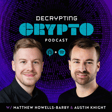
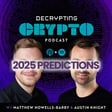
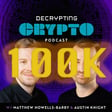
![CBDCs: The [Dark] Future of Money (Part 2 of 2) image](https://media.zencastr.com/cdn-cgi/image/width=112,quality=85/image-files/61fc0461fb20e00040aeb09e/5b9f1396-2a8e-418d-82a0-30fd00969266.jpg)

